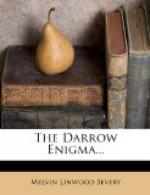within the sail
Of her desire? What if it shifted with
Direction of her breath? Or if the rudder of
Her will did lean as many ways as trampled straws,
And own as little worth? She was a woman still,
And queen. They do best understand themselves
Who trust themselves the least; as they are wisest
Who, for their safety, thank more the open sea
Than pilot will. Oh, Egypt’s self-born Isis!
Ought we to fasten in thy memory the fangs
Of unalloyed distrust? We know how little
Better is History’s page than leaf whereat the ink
Is thrown. Nor yet should we forget how much
The nearer thou than we didst come to
The rough-hewn corner-stone of Time. We know
Thy practised love enfolded Antony;
And that around the heart of Hercules’
Descendant, threading through and through,
Like the red rivers of its life, in tangled mesh
No circumstance could e’er unravel, thou
Didst coil,—the dreamy, dazzling “Serpent of
The Nile!” Thy sins stick jagged out
From history’s page, and bleeding tear
Fair Judgment from thy merits. We perchance
Do wrong thee, Isis; for that coward, History,
Who binds in death his object’s jaw and then
Besmuts her name, hath crossed his focus in
Another age, and paled his spreading figment from
Our sight. Thou art so far back toward
The primal autocrat whose wish, hyena-like,
Was his religion, that, appearing as thou dost
On an horizon new flushed in the first
Uncertain ray of Altruism, thou seem’st
More ghost than human. Yet thou lovest, loving ghost,
And thy fierce parent flame thyself snuffed out
Scarce later than the dark’ning of the fire
Thou gav’st to be eternal vestal of
Thine Antony’s spirit. Thou didst love and die
Of love; let, therefore, no light tongue, brazen
In censure, say that nothing in thy life
Became thee like the leaving it. The cloth
From which humanity is cut is woven of
The warp and woof of circumstance, and all
Are much alike. We spring from out the mantle, Earth,
And hide at last beneath it; in the interim
Our acts are less of us than it. We are
No judge, then, of thy sins, thou ending link
Of Ptolemy’s chain. Forsooth, we are too much
O’erfilled with wondering how like to thee
We all had been, inclipt and dressed in thine
Own age and circumstance.
Of her desire? What if it shifted with
Direction of her breath? Or if the rudder of
Her will did lean as many ways as trampled straws,
And own as little worth? She was a woman still,
And queen. They do best understand themselves
Who trust themselves the least; as they are wisest
Who, for their safety, thank more the open sea
Than pilot will. Oh, Egypt’s self-born Isis!
Ought we to fasten in thy memory the fangs
Of unalloyed distrust? We know how little
Better is History’s page than leaf whereat the ink
Is thrown. Nor yet should we forget how much
The nearer thou than we didst come to
The rough-hewn corner-stone of Time. We know
Thy practised love enfolded Antony;
And that around the heart of Hercules’
Descendant, threading through and through,
Like the red rivers of its life, in tangled mesh
No circumstance could e’er unravel, thou
Didst coil,—the dreamy, dazzling “Serpent of
The Nile!” Thy sins stick jagged out
From history’s page, and bleeding tear
Fair Judgment from thy merits. We perchance
Do wrong thee, Isis; for that coward, History,
Who binds in death his object’s jaw and then
Besmuts her name, hath crossed his focus in
Another age, and paled his spreading figment from
Our sight. Thou art so far back toward
The primal autocrat whose wish, hyena-like,
Was his religion, that, appearing as thou dost
On an horizon new flushed in the first
Uncertain ray of Altruism, thou seem’st
More ghost than human. Yet thou lovest, loving ghost,
And thy fierce parent flame thyself snuffed out
Scarce later than the dark’ning of the fire
Thou gav’st to be eternal vestal of
Thine Antony’s spirit. Thou didst love and die
Of love; let, therefore, no light tongue, brazen
In censure, say that nothing in thy life
Became thee like the leaving it. The cloth
From which humanity is cut is woven of
The warp and woof of circumstance, and all
Are much alike. We spring from out the mantle, Earth,
And hide at last beneath it; in the interim
Our acts are less of us than it. We are
No judge, then, of thy sins, thou ending link
Of Ptolemy’s chain. Forsooth, we are too much
O’erfilled with wondering how like to thee
We all had been, inclipt and dressed in thine
Own age and circumstance.
The exercises of the evening concluded with the reading of the familiar poem, beginning:
“I am dying, Egypt,
dying;
Ebbs the crimson life-tide
fast.”




